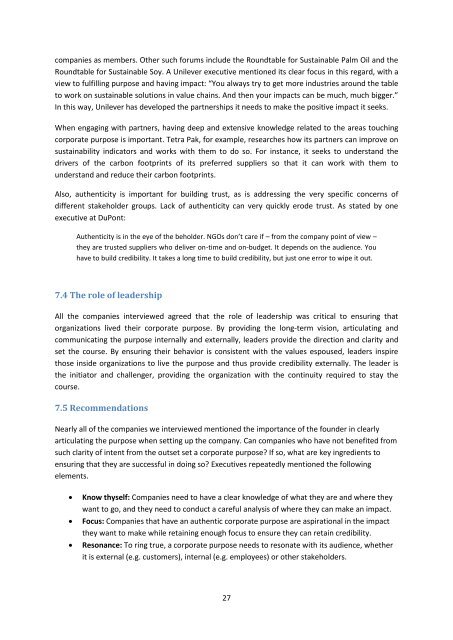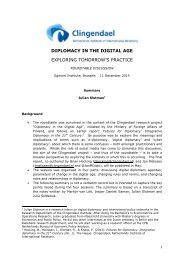BM_IMD_REPORT-How-Authentic-is-your-Corporate-Purpose
BM_IMD_REPORT-How-Authentic-is-your-Corporate-Purpose
BM_IMD_REPORT-How-Authentic-is-your-Corporate-Purpose
Create successful ePaper yourself
Turn your PDF publications into a flip-book with our unique Google optimized e-Paper software.
companies as members. Other such forums include the Roundtable for Sustainable Palm Oil and the<br />
Roundtable for Sustainable Soy. A Unilever executive mentioned its clear focus in th<strong>is</strong> regard, with a<br />
view to fulfilling purpose and having impact: “You always try to get more industries around the table<br />
to work on sustainable solutions in value chains. And then <strong>your</strong> impacts can be much, much bigger.”<br />
In th<strong>is</strong> way, Unilever has developed the partnerships it needs to make the positive impact it seeks.<br />
When engaging with partners, having deep and extensive knowledge related to the areas touching<br />
corporate purpose <strong>is</strong> important. Tetra Pak, for example, researches how its partners can improve on<br />
sustainability indicators and works with them to do so. For instance, it seeks to understand the<br />
drivers of the carbon footprints of its preferred suppliers so that it can work with them to<br />
understand and reduce their carbon footprints.<br />
Also, authenticity <strong>is</strong> important for building trust, as <strong>is</strong> addressing the very specific concerns of<br />
different stakeholder groups. Lack of authenticity can very quickly erode trust. As stated by one<br />
executive at DuPont:<br />
<strong>Authentic</strong>ity <strong>is</strong> in the eye of the beholder. NGOs don’t care if – from the company point of view –<br />
they are trusted suppliers who deliver on-time and on-budget. It depends on the audience. You<br />
have to build credibility. It takes a long time to build credibility, but just one error to wipe it out.<br />
7.4 The role of leadership<br />
All the companies interviewed agreed that the role of leadership was critical to ensuring that<br />
organizations lived their corporate purpose. By providing the long-term v<strong>is</strong>ion, articulating and<br />
communicating the purpose internally and externally, leaders provide the direction and clarity and<br />
set the course. By ensuring their behavior <strong>is</strong> cons<strong>is</strong>tent with the values espoused, leaders inspire<br />
those inside organizations to live the purpose and thus provide credibility externally. The leader <strong>is</strong><br />
the initiator and challenger, providing the organization with the continuity required to stay the<br />
course.<br />
7.5 Recommendations<br />
Nearly all of the companies we interviewed mentioned the importance of the founder in clearly<br />
articulating the purpose when setting up the company. Can companies who have not benefited from<br />
such clarity of intent from the outset set a corporate purpose? If so, what are key ingredients to<br />
ensuring that they are successful in doing so? Executives repeatedly mentioned the following<br />
elements.<br />
<br />
<br />
<br />
Know thyself: Companies need to have a clear knowledge of what they are and where they<br />
want to go, and they need to conduct a careful analys<strong>is</strong> of where they can make an impact.<br />
Focus: Companies that have an authentic corporate purpose are aspirational in the impact<br />
they want to make while retaining enough focus to ensure they can retain credibility.<br />
Resonance: To ring true, a corporate purpose needs to resonate with its audience, whether<br />
it <strong>is</strong> external (e.g. customers), internal (e.g. employees) or other stakeholders.<br />
27








